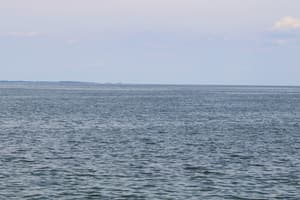Podcast
Questions and Answers
What is the main function of the ciliary body?
What is the main function of the ciliary body?
- To protect the eye from external damage
- To supply blood to the retina
- To control the amount of light entering the eye
- To adjust the shape of the lens to focus on near objects (correct)
What is the function of the choroid?
What is the function of the choroid?
- To control the amount of light entering the eye
- To detect light rays and transmit nerve impulses
- To hold the lens in place
- To provide blood supply and nutrients to the eye (correct)
What is the function of the suspensory ligaments?
What is the function of the suspensory ligaments?
- To control the amount of light entering the eye
- To provide blood supply to the retina
- To detect light rays and transmit nerve impulses
- To hold the lens in place (correct)
What is the function of rods in the retina?
What is the function of rods in the retina?
What is the main function of the conjunctiva?
What is the main function of the conjunctiva?
What is the function of the iris?
What is the function of the iris?
What is the main function of cones in the eye?
What is the main function of cones in the eye?
What is the name of the small depression located within the macula lutea?
What is the name of the small depression located within the macula lutea?
What is the point of entry for the artery that supplies the retina?
What is the point of entry for the artery that supplies the retina?
What is the name of the clear, watery fluid that fills the anterior and posterior chambers?
What is the name of the clear, watery fluid that fills the anterior and posterior chambers?
What is the result if the vitreous humor escapes from the eye?
What is the result if the vitreous humor escapes from the eye?
What is the function of the optic nerve?
What is the function of the optic nerve?
Flashcards are hidden until you start studying
Study Notes
Structure of the Eye
- The outer layer of the eye is the Sclera, also known as the "white of the eye", which is thinnest at the anterior surface and thickest at the back near the optic nerve.
- The Cornea is a transparent, nonvascular layer that covers the colored part of the eye and is continuous with the anterior portion of the Sclera.
- The Conjunctiva is a mucous membrane that lines the inner surfaces of the eyelids and the outer surfaces of the eye.
Middle Layer of the Eye
- The Iris is the colored portion of the eye that can be seen through the transparent corneal layer.
- The Pupil is located in the center of the Iris and controls the amount of light entering the eye by dilatation and constriction.
- The Lens is a colorless biconvex structure that aids in focusing images clearly on the retina.
- The Ciliary body is located on each side of the Lens and contains muscles responsible for adjusting the Lens to view near objects.
- The Suspensory ligaments radiate from the Ciliary body and attach to the Lens, holding it in place and assisting in adjusting its shape for proper focusing.
- The Choroid is the vascular part of the middle layer of the eye, located just deep to the Sclera and behind the Iris and Ciliary body, and contains extensive capillaries that provide blood supply and nutrients to the eye.
Inner Layer of the Eye
- The Retina is a sensitive nerve cell layer that transfers light rays into nerve impulses and transmits them via the optic nerve to the brain for interpretation of the image seen by the eye.
- The Retina consists of two types of nerve cells:
- Rods, responsible for vision in dim light and for peripheral vision.
- Cones, responsible for visualizing colors, central vision, and vision in bright light.
- The Macula Lutea is an oval, yellowish spot near the center of the Retina.
- The Fovea Centralis is a small depression located within the Macula Lutea, where the sharpest image is obtained when the image focuses directly on it, corresponding to central vision.
Optic Nerve and Optic Disc
- The Optic nerve receives impulses from the Retina and transmits them to the brain, where they are interpreted as vision.
- The Optic disc is the point where the Optic nerve joins the Retina, and it serves as the point of entry for the artery that supplies the Retina.
- The Optic disc is known as the "blind spot" of the eye because it contains no rods or cones.
Cavities of the Eye
- The Anterior cavity of the eye consists of two chambers:
- The Anterior chamber, located in front of the Iris, filled with clear, watery fluid called aqueous humor.
- The Posterior chamber, located behind the Iris, also filled with aqueous humor.
- The Posterior cavity of the eye is located posterior to the Lens and is filled with vitreous humor, a clear, jellylike substance that gives shape to the eyeball.
Studying That Suits You
Use AI to generate personalized quizzes and flashcards to suit your learning preferences.




